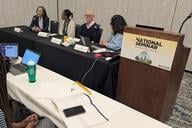You have /5 articles left.
Sign up for a free account or log in.

Wikimedia Commons
At a rally in Cincinnati in December, Donald J. Trump hammered home his “America first” message and took a shot at “global citizenship,” a term with considerable currency in academe.
“You hear a lot of talk about how we're becoming a globalized world, but the relationships people value in this country are local -- family, city, state, country,” the president-elect said as part of a pitch to protect American workers. “They're local. We'll compete in the world, we want to compete in the world, but we're going to compete in the world where it's a two-way road, not a one-way road. The advantages are going to come back to our country, and they haven't for many, many years. There is no global anthem, no global currency, no certificate of global citizenship. We pledge allegiance to one flag and that flag is the American flag."
At this point in his speech, the crowd broke into cheers and chants of "U.S.A." Trump continued, “From now on it's going to be America first, OK? America first.”
“When that speech first got posted online, my colleague and I crossed paths in emailing, saying, ‘Uh-oh. This could directly affect us,’” said Hillary Landorf, director of Florida International University’s Office of Global Learning Initiatives and an associate professor of international and intercultural education.
Granted, in his speech Trump made no explicit mention of education, but the concept of “global citizenship” -- a term that has many definitions but in general implies things like an attitude of empathy and openness, an appreciation of diversity and multiculturalism, an awareness of global interconnectedness, and a sense of civic obligation to do one’s part to address global problems -- has very much been absorbed into the ethos of American universities.
Indeed, there is such a thing as a certificate of global citizenship, whatever value one might or might not ascribe to it. A quick Google search will turn up a range of universities that offer such a certificate, typically to recognize the completion of some combination of internationally focused course work and a study abroad experience.
To a broad degree, American universities have embraced -- at least in theory, albeit to different degrees in practice -- the mission of preparing students for life and work in an increasingly interconnected world. The idea of global or international learning is ubiquitous in higher education. A 2011 survey by the American Council on Education found that about half (51 percent) of colleges reported that their mission statements refer to global or international education or another aspect of internationalization. A similar percentage -- 52 percent -- of responding institutions said an aspect of internationalization is among the top five priorities outlined in their strategic plans.
While it's unknown at this stage exactly what policies a Trump administration might pursue, it's possible a Trump presidency could undermine one aspect of this internationalization -- the recruitment of international students. It remains to be seen whether the president-elect’s exclusionary rhetoric -- including his calls to build a wall, at Mexico’s expense, on America's southern border, and his proposal in December 2015 to ban entry of all Muslims to the U.S. -- might cause prospective international students to look to a different destination. Trump has also proposed temporarily suspending visa processing in regions of the world that “have a history of exporting terrorism” and implementing what he calls “extreme vetting” of visa applicants -- both changes that, if enacted, could depress enrollments from the Middle East in particular.
But, international student recruitment aside, the anti-globalist sentiment that helped fuel the election of Trump and, in Europe, Great Britain's referendum in favor of exiting the European Union, arguably poses a broader challenge to higher education and some of its key values.
“At the macro level, both results are a challenge to the assumption that internationalization, in all its forms, is necessarily to the benefit of all concerned,” Fiona Hunter, a consultant and the associate director of the Center for Higher Education Internationalization at the Università Cattolica del Sacro Cuore, in Milan, and Neil Sparnon, a Britain-based higher education consultant, wrote in a recent blog post for the European Association for International Education. “Indeed, both results have been described as a form of nativism which explicitly rejects the value of multiculturalism and internationalization. As British Prime Minister Theresa May said at the Conservative Party Conference in October, ‘If you believe you are a citizen of the world, you are a citizen of nowhere; you don’t understand what the very word “citizenship” means.’”
“The most startling aspect of this position is not its appeal to nationalism and the politics of patriotism and identity -- British prime ministers of all hues have appealed to notions of patrie for generations -- but the binary nature of the choice: you cannot be a citizen of your country and of the world; you must choose,” Hunter and Sparnon continued. “If you choose poorly, your views are of no value. This is a genuine challenge to the very concept of internationalization as it has come to be understood in the higher education sector.”
Similarly, Trump’s juxtaposition of the global as oppositional to the local in his speech in Cincinnati was a familiar rhetorical move for some experts on the concept of global citizenship.
“There’s kind of a reactionary drift in American national politics that shuns any idea that might imply a downgrading of national sovereignty even though today’s understandings of global citizenship don’t question sovereignty,” said Hans Schattle, a professor of political science at Yonsei University, in Seoul, South Korea, and the author of The Practices of Global Citizenship.
In a 2012 essay, Schattle wrote that while the terms “global citizenship” and “cosmopolitanism” can be taken literally to describe the creation of global governing institutions and enforceable provisions intended to protect human rights and freedoms, the terms are more commonly defined figuratively -- “often focused mainly on ethics and culture rather than politics -- such as reaching out to individuals from other ethnic and religious backgrounds, accommodating diverse groups of people within domestic societies, devoting energy and resources to humanitarian endeavors around the world, and accepting voluntary standards of ethical behavior within the world economy.”
"In many ways not something to be taken literally," said Schattle. "It’s more about practices."
Fernando M. Reimers, the Ford Foundation Professor of the Practice in International Education at Harvard University’s Graduate School of Education, described Trump’s comments in Cincinnati about there being no global anthems as reflecting “a dated viewpoint that creates false oppositions between being an American and being a global citizen.”
“I know full well that there is no global jurisdiction in the way there is national jurisdiction and there is no global passport and global language, but I also know that global affairs shape the lives of most people on this planet and are totally intertwined with local affairs,” Reimers said. “Simply to make sense of your life, let alone improve it, you need to understand it. If you don’t understand it and you act as if it doesn’t exist, you may shoot yourself in the foot.”
“Higher education should produce people who are cosmopolitans who understand the world in which they live,” Reimers continued. “We do have real global challenges that cannot be resolved by nation-states; we need people to have the opportunity to address those challenges collaboratively.”
What, then, should universities and educators do to respond to the current political climate?
“What we can do is keep doing what we’re doing,” said Landorf, of Florida International University, “meaning giving students the opportunity to do global learning with diverse others, and also to advocate for global learning and global education through public statements.”
Peter N. Stearns, a historian, university professor and former provost at George Mason University, said one implication of the political climate is the need to pay careful attention to the downsides of globalization in teaching about global patterns and change. The fact that many people feel left behind by globalization -- that it has winners and losers -- was brought into sharp relief by the U.S. presidential election, not to mention Brexit.
“Trump Won. Globalization Lost. Now What?” read the headline of a Nov. 10 Boston Globe column by Indira A. R. Lakshmanan, who partially ascribed Trump’s win to “Americans who feel left behind by trade and threatened by immigration …. Trump tapped into and amplified their economic and cultural dislocation. Half of America voted to repudiate what Trump caricatured as ‘globalism’ -- open borders, free trade and international treaties pushed by a cabal of global elites led by the former secretary of state.”
“There was a certain potential simplicity in talking about global citizenship as an educational goal,” said Stearns, who is the author of Educating Global Citizens in Colleges and Universities: Challenges and Opportunities. “That’s something we need to be willing to debate, but I don’t think we’ve ever said globalization is just great for everybody; all we need is more of the same. I just think we need to urge students to apply critical thinking to globalization and to critics of globalization as we do to other important topics.”
“But I think we need to break it down,” Stearns continued. “What Trump can’t do rhetorically is erase the fact that global connections have become increasingly important. What we do need to insist on [is] the need to prepare students who understand global connections, who understand how they’ve emerged. Again pluses and minuses -- it’s not all good -- but that is the world, and Trump is not going to repeal it.”
Stearns added, “Not contradicting myself that we need to be appropriately critical of the concerns about globalization -- we do have a massive historical precedent for what happens when societies pull out of a collaborative global framework. There’s no reason to back away from that precedent even while admitting problems. A batch of societies in the 1920s and ’30s pulled back from globalization in favor of nations first, high tariffs, etc., and the results were clearly unfortunate from the standpoint of economic prosperity, and they were clearly unfortunate from a standpoint of international peace. Now, that doesn’t mean we can predict what will happen if we get another round of this, but it does raise legitimate issues for discussion.”
The terms "global citizenship" and even "global learning" as they're understood in higher education have their critics, however. In a 2014 essay for the conservative magazine the National Review, Peter W. Wood, president of the National Association of Scholars, which advocates for a traditional curriculum, described global citizenship-focused education in ideological terms. He wrote, "The campus left has found in the conceit of teaching students to be 'citizens of the world' a new way of fostering a soft disdain for the American civic tradition. That disdain is now disguised as magnanimity: students are enticed to feel openhearted, broad-minded and gently virtuous."
“The term ‘global learning’ is at this point probably too fraught with implications that one can learn about the rest of the world without much knowledge of America or even the West more broadly conceived,” Wood said in an interview.
“When a student in college begins to speak this language, it frequently registers a kind of obtuseness about the importance of learning about this nation’s traditions, of self-government, the principles upon which a republican form of self-government -- republican with a small R -- have subsisted for over 250 years,” said Wood. He criticized the superficiality of focusing on global citizenship as an ideal without corresponding attention in higher education to foreign languages, and added he was troubled by “the concept that higher education can create a detour around learning about one’s own society and its past for better and worse -- the good things about its past as well as its bad things. The deep understanding of that and its complexity tends to be sidelined by the idea that one can move effortlessly into becoming a cosmopolitan person.”




